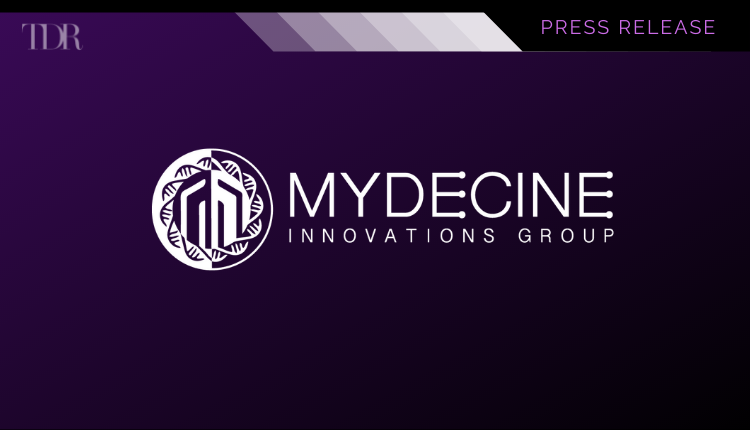
Mydecine Innovations Group Announces MYCO-001 Seamless Phase 2/3 Smoking Cessation Clinical Trial
Dr. Matthew Johnson will lead research to look at the science and efficacy of MYCO-001 for the treatment of smoking cessation and nicotine dependence
Mydecine Innovations Group™ (NEO: MYCO)(OTCMKTS: MYCOF), a biopharmaceutical company focused on the treatment of mental health and addiction, announced it has partnered with Principal Investigator Dr. Matthew Johnson of Johns Hopkins University on a study evaluating the administration of MYCO-001 with a structured smoking cessation treatment program in nicotine dependent individuals.
The planned placebo-controlled study, based with the Johns Hopkins psychedelic research group, will study the science and efficacy of MYCO-001 to treat nicotine dependence. Dr. Matthew Johnson, a globally recognized leader in this field who has published extensively on the science of psychedelics, has been contracted by Mydecine to complete this phase 2/3 clinical trial of his ongoing research and develop methodologies to better advance future-controlled studies and clinical trials of psychedelics. The proposed study is projected to launch in Q1 2022 and will be looking at primary endpoints of three and six months. This study could be completed as early as Q4 2022.
Combining two or more phases into one study is known as an operationally seamless clinical trial. Operationally, seamless clinical trial designs utilize results acquired throughout the trial to adjust the course of the study as data is collected. Analyses of the accumulating study data are performed at pre-planned time points within the study; therefore it could be possible to change the study dose, treatment duration, or study endpoints. This adaptive approach allows resources to be used more efficiently and can often be more informative and ethical than a traditional fixed design.
A 2014 Johns Hopkins University study published in the Journal of Psychopharmacology, showed an 80% abstinence rate at six months. Currently, the center is conducting a continuation on smoking cessation with a randomized comparative efficacy study involving 80 patients in which a transdermal nicotine patch and cognitive therapy treatment or psilocybin and cognitive therapy treatment are administered. Over half of the patients in the ongoing study have completed their 13-week program with compelling success rates that far exceed the 10% to 35% success rates for traditional smoking cessation therapies.
Current clinical data coming out of Johns Hopkins on the ongoing smoking cessation study is showing 12-month efficacy rates significantly higher than today’s gold standard with drastically increased safety profiles. We have been diligently working with the teams at Hopkins, Applied Pharmaceutical Innovation, The Weinberg Group, and ethica CRO to design the planned study.” Bartch continues on to say, “We firmly believe in the high likelihood of receiving breakthrough therapy status on our MYCO-001 product for smoking cessation and look forward to updating the market soon on future developments.
Mydecine CEO Josh Bartch
Tobacco, and its active ingredient nicotine, is one of the most highly addictive substances in the world, and one of the deadliest. According to the Centers for Disease Control (CDC) and Prevention, cigarette smoking is responsible for one out of every five deaths in the United States, roughly 480,000 people every year. Smoking is also directly associated in $1.4 trillion in health expenditures and productivity losses combined.
Approximately 14% of the U.S. population, 34.1 million Americans, currently smoke cigarettes.
- 68% have stated they would like to quit smoking
- 55% have made an attempt to quit
- Approximately 7.5% are successful
In 2019, the global market for tobacco addiction was valued at $6 billion. By 2026, the market is expected to reach $64 billion, growing at a CAGR of 16.9%. Currently, the most popular form of tobacco addiction treatment is Nicotine Replacement Therapy (NRT), with various formulations available in transdermal patches, spray, gum, lozenges, and so on.
“As a physician who has worked with many patients struggling to quit highly addictive substances, I have seen firsthand the tremendous harm nicotine has on the body,” said Mydecine CMO Dr. Rakesh Jetly. “We are excited to be working alongside Johns Hopkins University toward safer and more effective treatments.”
Until it was recalled in July 2021, one of the most successful smoking cessations treatments was varenicline, or Chantix. Sales for Chantix reached $1.1B in 2020 despite the potential harmful side effects. Although a wide variety of treatments exist, tobacco addiction continues to remain largely untreated.
“We wholeheartedly believe the future success of psychedelic medicine is dependent on collaborative efforts between top-tier research institutions and private organizations to better understand the effectiveness of these drugs compared to current treatment options. The research of Dr. Johnson and his team at Johns Hopkins University has played a significant role in the renaissance of psychedelics and its growing acceptance within the scientific and medical communities. We are honored to begin working with them to advance this important study,” said Chief Science Officer of Mydecine, Rob Roscow. “Additionally, as Mydecine advances its own commercialized efforts to develop novel molecules and drug candidates like MYCO-001, the work of Dr. Johnson will inform as to how we can best build upon the academic success seen in this field and advance real world treatment options for the patients who desperately need them.”
Dr. Matthew W. Johnson, Ph.D., is a professor of psychiatry and behavioral sciences at Johns Hopkins University. He is one of the world’s most published scientists on the human effects of psychedelics and has conducted seminal research in the behavioral economics of drug use, addiction, and risk behavior. As principal Investigator, he developed and published the first research on psychedelic treatment of tobacco addiction in 2014. Dr. Johnson was the 2019 president of the Psychopharmacology and Substance Abuse Division of the American Psychological Association and is current president of the International Society for Research on Psychedelics, an organization he founded with colleagues.
To view the original press release in its entirety click here



